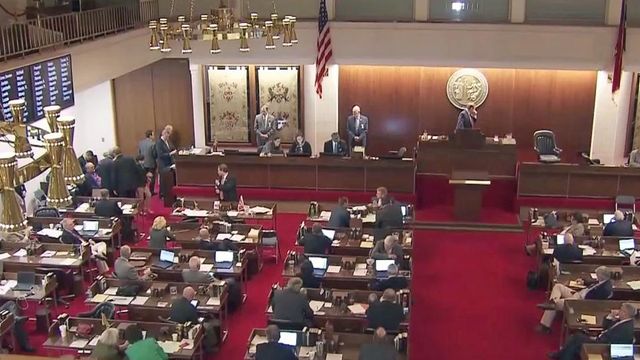Cooper signs $800M Florence relief package into law
The General Assembly promised nearly $800 million in Hurricane Florence recovery funding Monday night, focusing largely on needs legislative leaders deemed immediate in the wake of massive flooding in southeastern North Carolina.
Posted — UpdatedThe votes were unanimous, and Gov. Roy Cooper signed the legislation by Tuesday morning.
"I appreciate legislators responding quickly and taking this initial step to help North Carolinians recover from this devastating storm, particularly in the areas of education and the federal match," Cooper said in a statement. "However, we must continue to work together to provide more for affordable housing and farmers as well as to make real investments to ensure clean water and to lessen the impacts of future storms on our homes, roads, businesses and water infrastructure."
About half the money approved Monday was designated for specific purposes. The other half legislators said would be "walled off," promised to the recovery but not attached to line items in order to preserve flexibility as the state continues to analyze damages.
Among the funding approved Monday:
- $65 million to draw down federal disaster recovery dollars that will go to victims of the storm, plus another $23 million for a homeowner repair and rehabilitation fund
- $10 million to help develop new affordable housing
- $65 million to draw down federal transportation funding
- $60 million to help repair K-12 schools
- $30 million to repair university campuses, particularly in Wilmington, Pembroke and Fayetteville, and $5 million for community colleges
- $8.5 million to stabilize community college budgets and offset enrollment declines in the wake of the flooding
- Scholarships of up to $1,250 per student per semester for university and community college students affected by the storm
- $2 million for mosquito spraying programs
- $20 million to help local governments make repairs and replace vehicles or other equipment.
Most of the funding will come from the state's "rainy day" reserve fund, which was built up to $2 billion in recent years. Cooper's plan would have taken less from that fund, relying instead on a surplus built into this year's budget plan.
That surplus is needed to help fund next year's budget, Senate President Pro Tem Phil Berger said.
About $65 million will come from the state's Highway Fund and $25 million from the lottery. There won't be any tax increases or interruptions in existing state services to cover the cost of the bill, budget writers said.
The bill sets up a fund to reimburse farmers for at least some of the crops and livestock they lost in the floods, but grants this program would eventually make aren't yet funded. That, legislators said, will come later.
The General Assembly returns to session in late November, and lawmakers have said they expect to deal with at least some recovery issues then as well.
"This bill will be followed by others, I'm sure," said Senate Appropriations Co-Chairman Brent Jackson, R-Sampson, a major supporter of agriculture in the legislature.
There's also a moratorium on local building permit fees and other construction fees in the bill, effective until the end of the year.
There's a prohibition on using state dollars to rebuild within the 100-year flood plain. Some questioned the rule, noting that flooding from both Matthew and Florence far exceeded that area, and the storms came within two years of each other.
"Your point is well taken," Dollar said, in response to a suggestion that the prohibition be widened. "But you also have to bear in mind an individual's property rights."
The 100-year flood plain rule also has an opt-out, allowing people to rebuild in the area if their local government has flood plain ordinances and those more rigorous construction rules are followed.
The bill also addresses an issue left over from Hurricane Matthew, forgiving overpayments National Guard members received in the wake of that storm. Guard members had been expected to pay that money back following a state audit.
The overpayments totaled less than $40,000 to more than 1,000 soldiers.
Initial state projections put the total damage from Florence just short of $13 billion, but that figure is based largely on flood mapping and computer wind modeling. Actual inspections are underway.
Related Topics
• Credits
Copyright 2024 by Capitol Broadcasting Company. All rights reserved. This material may not be published, broadcast, rewritten or redistributed.






